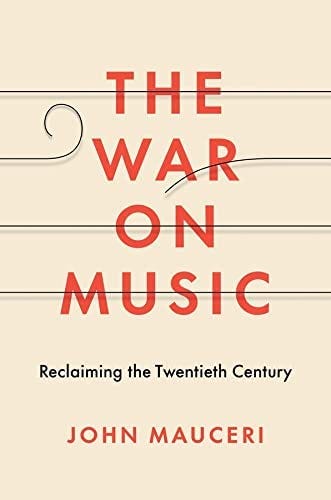The War on Music
John Mauceri's latest book reads like a polemic that pulls no punches towards the business of music or its academic counterparts
One of the distinguishing characteristics of the Holocaust was, as French intellectual Bernard-Henri-Lévy describes it in The Genius of Judaism, that it was “…the only massacre designed to be final.” He elaborates, “So great was the will to annihilate that even the traces of the exterminated—their culture, language, places of worship, books—were to be wiped off the surface of the earth as if they had never existed, as if no Jewish being had ever been conceived or created.” So-called “degenerate music” (entartete Musik, music of Jewish composers and others) was no exception. This is, of course, not difficult to imagine. Yet despite the Allied victory and removal of the Nazi regime, much of the music banned during the Reich is yet to return to the concert halls in the same way. Perhaps the music of Korngold, Weill, Hindemith, and Schönberg merely fell out of favor in Europe. After all, the popularity and legacy of composers is often a flimsy proposition, and post-war Europe was a new place. But John Mauceri isn’t buying any of it. In his latest book, The War on Music (Yale University Press, 2022), Mauceri, the American conductor and educator with over seventy major recordings to his name from Bernstein to Bizet, takes aim at the post-war Europeans who decided to continue what Mauceri feels was and is a silent or “tacit” ban borne out of their own shame for having endorsed the Reich’s policies to begin with. And so, the policies - now unwritten - continued.
The way John Mauceri sees it, once the Reich fell, all of the Nazi-sympathizing academics involved with helping select and enforce the bans on degenerate music scrambled to come up with post-war justifications for their inexcusable dereliction of duty as music educators, scholars, and human beings. After all, they didn’t merely just disappear from their previous positions, Mauceri argues:
For European intellectuals, including but not limited to German and Italian music critics and professors, there was also a sense of panic to find justifications for what they had said and published in all those complicit and now compromising classes, speeches, and academic papers.
This would, of course, raise the obvious follow-up: what about the Russians? Certainly they would not want to continue a Reich policy. Or would they? To this, Mauceri says:
An entire generation of music was eliminated by the passionate feelings of the vanquished—articulated in the most authoritative voices of “experts” and subsequently by the victors who respected their opinions and needed their support in the new war with a new enemy—Soviet communism. A simple solution was found that involved a tacit agreement between the masses and the masters: Do not play any of it. The “Nazi” music and the entartete Musik the Nazis banned fell into the same convenient category of inconvenient music.
The War on Music is far from merely a laundry list of blistering arguments. It is also a championing of the love of music. Apart from the obvious of being offended by the vile inhumanity and immorality of the Nazi/Soviet edicts (which Mauceri outlines eloquently and passionately from Wagner and others), it is obvious that Mauceri is also offended by those who would bar others from enjoying music: “gatekeepers.” In this pursuit, the New York native - now 77 - leads by example by presenting audiences with the widest spectrum of music conducting film scores, pop music, Broadway musicals, and he even had a featured voiceover part in the best-selling game franchise, the irreverent and enigmatic Grand Theft Auto series.
At just over 300 pages, The War on Music is a stellar and eminently readable work of great scholarship and polemical worth. John Mauceri is the musical big brother you always wanted: witty, smart, and ready to beat up the class bully at lunchtime. As he writes, “It is called music. It is yours, and because it is yours, it is great.”




